Music Creators Guide To Copyrights, Royalties, And Recording Contracts
Are you a songwriter wanting to get your music published and earn some royalties from your music? Do you want to copyright your songs? Have you thought about getting your band signed to a record contract?
Musicians and songwriters who want to get their music published need to understand how royalties are paid. This topic creates a lot of confusion but is really simple when you break it down. This post will help you understand how musical royalties are split and paid.
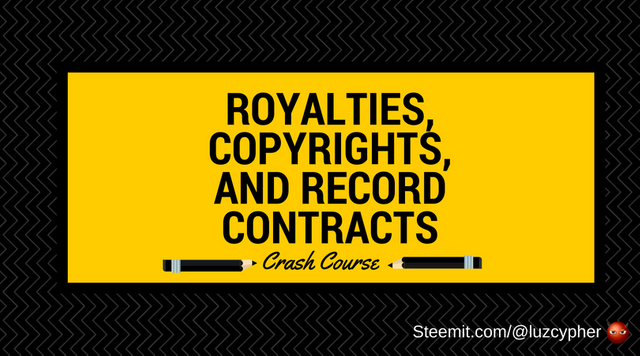
Copyrights Are A Weapon, Not A Defense
Before we begin let's talk about copyrights. Filing a copyright on a song you have written is a fairly straightforward process. I won't go into the details but you can find them in this PDF put out by the Library of Congress Copyright office.
People think that filing a copyright is a defensive measure to protect you from copyright infringement. No, it is not a defensive measure, but an offensive weapon. That's what I was taught at UCLA Mucic Business school. You want people to steal your copyrighted material and make lot's of money on it so you can sue them and get paid. It's not designed to protect you. It's designed to attack those who infringe on your material you have a copyright on.
So many songwriters are afraid of having their music stolen, but if you have a copyright on it that is exactly what you want to happen. Not only that, you want whoever steals it to make a lot of money on it so you can sue them in court and get paid. It's a weapon to sue people who steal your music, not a defensive maneuver to protect your music. Got it? Good.
Now let's move on.
Who Is First?
I have copyrights on many songs, have been published, received royalty checks and sometimes still get them, but I have only done this in the United States, so, everything we'll be discussing here applies to US copyright law, but many countries have very similar laws.
When you file a copyright on a song you basically are registering the fact that you and your co-creators have created it. The truth is if you can show that it was created on a specific date prior to anyone else producing it you will win in court if anyone tries to steal your song, even if you never filed for a copyright.
For example, I made a video a couple weeks ago of a new song I created and posted it to YouTube. Since I know I wrote this song, if it ever was performed or produced by someone else who then makes a lot of money releasing it, I can sue them even without a formal registration at the US copyright office because I can prove by the date it was uploaded to YouTube and posted to Steemit that I created it before they did. That would be enough to hold up in court.
Filing the song with the US copyright office would give me an even stronger case, but the truth is, any recording of the song that is proved to be the first recording of it and is somehow time-stamped, like a YouTube video, is enough to win a case. You could make a recording, put it in an envelope, mail it to yourself and never open it and that would work as well.
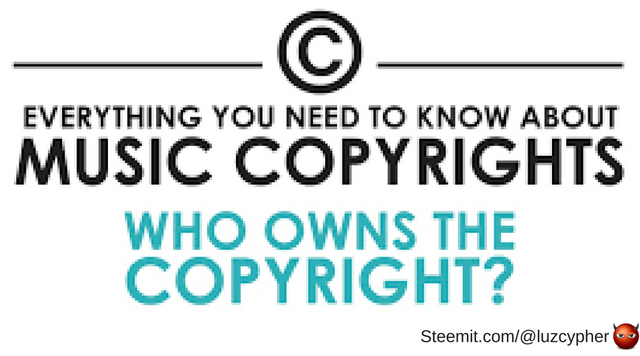
Filing it with the Library of Congress US copyright office gives you more options and protections and allows you to register who created each part of it if you co-wrote it. There are different forms depending on whether you are registering a performance/recording, the music/lyrics, etc..
If you hired musicians to record it and paid them to do so, you check a box on the form that says work for hire, meaning they got paid and hold no claim to the rights of the song.
How The Pie Is Sliced
Now on to how royalties are divided. This is where lots of people get confused. To simplify, let's break up the royalty pie into two halves.
The writers half and the publishers half.
The writers are anyone who helped to create the song. If you wrote the melody and the lyrics and are the sole creator of both then you would own 100% of the writer's half.
If you wrote only the melody or music and someone else wrote the lyrics then you would own 50% of the writer's half and whoever wrote the lyrics would own the other 50% of the writer's half.
If there were 3 people involved in writing the song then each would own 33.33% of the writer's half and so on. Got it? Good. Now let's move on.
What is a publisher?
In the music industry, a music publisher (or publishing company) is responsible for ensuring the songwriters and composers receive payment when their compositions are used commercially. Through an agreement called a publishing contract, a songwriter or composer "assigns" the copyright of their composition to a publishing company. In return, the company licenses compositions, helps monitor where compositions are used, collects royalties and distributes them to the composers. They also secure commissions for music and promote existing compositions to recording artists, film and television.
The copyrights owned and administered by publishing companies are one of the most important forms of intellectual property in the music industry. (The other is the copyright on a master recording which is typically owned by a record company) Publishing companies play a central role in managing this vital asset.
So you may be asking yourself what the hell do they really do and why do I need them and, more importantly, why should they get the other half of the royalties on my music? That's a really good question.
A good publisher has contacts in the music industry and with record companies, they know who is looking for material to record, they know how to monetize music by getting on people's records, played on radio station, added to films, and are willing to pay out of their own pocket to make that happen. If they fail to do so they make nothing and you, as the artist do not have to pay them back for the cost they incurred.
They take the risk and if they are successful can make both you and themselves money. That's why they get to own the publishing rights to your song as an incentive to use their influence and contacts to get your music published.
In a typical case, they own 100% of the publishing rights, which is equal to 50% of the royalties earned on a song.
So, back to our example, to keep this explanation simple let's assume that you are the sole creator of both the music and lyrics of your song and you have a publisher.
100% of the publishing rights = 50% of all royalties.
100% of the writer's rights = 50% of all royalties.
If you co-wrote the song with someone and had a publisher then it would look like this.
100% of the publishing rights to the publisher = 50% of all royalties.
100% of the writer's rights = 50% of all royalties split between the writer's with
25% paid to the writer of the music
25% paid to the writer of the lyrics
Performing Rights Organizations
Before we move on there is one more thing you need to know. There are 5 different performing rights organizations in the US and the two biggest and oldest ones are BMI and ASCAP. BMI stands for Broadcast Music, Inc. and ASCAP stands for American Society of Composers, Authors, and Publishers.
These organizations collect royalties on behalf of musicians and publishers and as a songwriter looking to get paid for your music you need to be registered with one of them. Your publisher needs to be registered with the same one and it's for life. You cannot be a songwriter on more than one. I'm registered with BMI. They are both just as good as the other and I picked BMI because I liked the artists affiliated with them. You will need to do this when you file for a copyright. There's a box to check for which organization you are registered with and when looking for a publisher they will need to be registered with the same organization.
Royalties
Are you with me so far? Good. Let's move on to what kinds of royalties a song can earn.
The four main types of royalties are:
- Mechanical Royalties
- Public Performance
- Synchronization (Sync)
- Print Music
Mechanical Royalties
Mechanical royalties are paid upon physical reproduction of an artist’s work. For example, when a record company produces records they need to pay royalties every time a single copy is reproduced. This is most often negotiated on the front end of a contract between a music publisher and record label. These royalties apply to any physical format of music, including vinyl, cassette, and CD productions.
It does not matter if the CD actually gets sold or not. If a record company pressed 10,000 CD's and your song is on it, you would get paid a mechanical royalty for each copy.
The current statutory mechanical royalty rate for physical recordings (such as CDs) and permanent digital downloads is 9.1¢ for recordings of a song 5 minutes or less, and 1.75¢ per minute or fraction thereof for those over 5 minutes.
So if you have a 3-minute song that is downloaded or physically pressed into 10,000 CD's the record company would need to pay royalties of:
10,000 x 9.1¢ = $910
Doesn't matter if they sell a single copy of the CD they need to pay you that money, but it's not all yours.
If, as in our example, you were the sole writer and had a publisher 50% of that would be yours and 50% would be the publisher's so you would earn $455 for every 10,000 copies pressed or downloaded. That's not a lot of money, is it?
If you made your own CD with 10 of your own songs on it then the record company would need to pay you for each of the ten songs. For each 10,000 CD's pressed you would earn $4550.
Most music these days are delivered by streaming and has an even lower rate.
Streaming mechanical royalties are also generated from the Reproduction copyright. Royalties are owed whenever a songwriter's song is streamed through an interactive streaming service, where interactive refers to the user ability to choose songs, pause, rewind and forward and create playlists without restrictions. These services include Spotify, Xbox Music, Pandora, Last.FM, Rhapsody and more. The government-mandated royalty rate is 10.5 percent of the gross revenue minus the cost of public performance. The average rate per stream is about $0.005.
So if your song was streamed 10,000 times you would earn $5.00 - the 50% publisher's share = $2.50.
Can you see why I got out of the music business once the MP3 was invented? Steemit is looking a lot better for musicians now, right?
Public Performance
Public performance royalties are the most wide-reaching, common form of royalties that are issued to musicians. By definition, public performances pertain to any performance of copyrighted material. This can include but is not limited to, airing music on the radio, live performances, performances recorded for film or television and playing copyrighted work over stereos in public spaces. Most often performance royalties are paid to performance rights organizations (PRO's) such as BMI or ASCAP. The PRO's collect the royalties and pay them out to the artists that have signed with them as representation, after taking a cut for operating costs.
There is no cleancut easy to calculate rate on how much a songwriter gets paid for a public performance. Let's say you have a hit song on the radio and are affiliated with BMI. Radio stations have to report every time they play a song. still called spins, to the PRO it is licensed from.
Each radio station is assigned a weight, A, B, or C, depending on the number of listeners it has, then the time of day is a factor. A song played a 3 PM will have fewer listeners than at 12 PM, then the number of spins, other songs the writer has written that were previous hits, the length of the song, and a whole bunch of other factors.
The radio stations pay the PRO's and all the money they collect is split between all of the songwriter's affiliated with that PRO. That pie is split among nearly every songwriter imaginable, from John Lennon to John Legend (to your cousin Tom Lemon, who plays in a local Bluegrass band). Given that they write some of the most-played Pop hits in the world, The Beatles would make a significant share of this income from Performance Royalties.
Back when I was touring in a band Tower Records was the place to sell your CD's. The MP3 was not a thing yet but was just getting started.
The cool thing about Tower Records was it was linked to a system called Star Tracker. Getting radio play in a city meant I could get my CD stocked in Tower Records. Each time a salesperson made a sale of our CD in the store it would record the sale in Star Tracker and at the same time order another CD so they could keep the store stocked.
I would get a report via fax that would document every time a CD was sold, the exact store it was sold in, the exact time of day it was sold, and every time one of our songs was played on the radio in that city. Using this information I could get a show booked there if the numbers were good. A club owner would bump other acts to put us in because our numbers indicated they would have a full club if they booked us instead. Brutal, but it worked.
You could actually see the correlation between the time the radio station spun the song and the sales of the CD's at the store, with the bump in sales after we played a show in that city or got more spins on those local stations.
I would then use those bookings to leverage advances from T-shirt companies because I no longer had time to make my own T-shirts once we started touring that much. The biggest shirt manufacturer at the time was a company owned by concert promoter Bill Graham called Winterland.
They could look at our tour schedule and Based on the number of shows, size of the venues, and ticket sales, they could calculate how many T-shirt would sell at those shows. They would write us an advance check based on that estimate. Sounds great right? Well, it's not. When I made and sold the shirts myself I made $9 profit per shirt, but when Winterland did it for us I made $1 profit per shirt. Sure, they did all the work and advanced me $20,000 up front, but we could have made a lot more if we could have afforded to keep it in-house. How do you do that? Keep reading.
Synchronization Royalties
Sync royalties are paid when you license a song for use in a TV show, Film, Trailer, Video Game, TV Commercial, or any other visual that needs to be 'sync'd' with music.
These royalties is completely negotiable up front and vary widely depending on who has negotiating leverage. A no-name band starving for exposure is not going to get as much as an artist with a current hit song, who can often name their price.
The most leverage you can have is if the movie your song is in has the same title as your song that is currently a top 10 hit right when the movie is being released, the song is played in its entirety during the opening credits and with no other voice tracks played over it.
I was with my friend Bill Bottrell (he's written and produced many well known songs and artists) who wrote and produced the hit song Leaving Las Vegas on Sheryl Crow's debut release when he got his share of the royalty check from the film company, United Artists, that made the movie with the same name starring Nicholas Cage and it met all the criteria mentioned. We opened a bottle of wine as he opened the envelope and showed me a check for $400,000! Jackpot. That was just from the movie. It also was and still is all over the radio.
Another friend of mine who managed a Memphis, blues guitarist name Lonnie Mack who happened to be a good friend of American musician, singer, songwriter, and record producer Stevie Ray Vaughan recorded a performance they both did at the Atlanta Pot Festival. He paid $8,000 out of his own pocket to record the performance with three cameramen and a helicopter camera.
Years later when Stevie Ray Vaughan died, Sony records, the company he was signed to put out every video of every performance they could get their hands on and made millions. When they went searching for more my friend made an offer of $3.1 million for the film rights. He got $1.2 million. After 30-years in the business that was his jackpot and he retired.
Sync rights can net you some of the biggest checks if you're a hit already.
Print Music
US print royalties are paid by printers to the song owner that granted the print music license (usually the music publisher). The print licenses are usually non-exclusive and limited to three to five years in duration. For a single-song sheet music, publishers are usually paid 20% of the marked retail price (or about 70¢ @ $3.50 retail price). Folio (if your song is included in a book of sheet music with other songs from other writers) royalties are paid at 10% to 12½¢ of the marked retail price (about $14.95 to $16.95). There is usually an extra 5% of the marked retail price for personality folios, which requires an additional license or consent for the right of publicity.
You Don't Need To Get Permission To Record Songs
Another big misconception about copyrighting your music has to do with granting permission. If you have a copyrighted work that has never been published before then yes, an artist, producer, publisher, or record company needs your permission to use your song. Once your song has been published, however, they do not need your permission to use it as long as they pay you the required royalty.
For example, if I wanted to made a compilation CD of previously published hits from the 90's and sell it on TV or the internet, I can do that without needing prior permission from any of the artists or publishers. I just need to pay all the royalties, starting with the mechanical royalties for pressing the CD's, which is currently .091¢ per song per CD. If I had a CD with 10 songs on it from the 90's that would be .91¢ per CD.
If I wanted to use their song in a movie, however, that's a different story and would need to be negotiated beforehand.
If you had a band that wanted to record Paint It Black by The Rolling Stones you don't need to ask for permission to do so as long as you're willing to pay the full royalties to the writers and publishers of the song. If your version of the song became a hit on the radio, you would get performance royalties for your performance of the song but the original writers and publisher would make the bulk of the money from radio play, Cd's pressed, and any sync right's if it was included in a movie. This can still work in a new band's favor as the song is very popular and the original publisher would have a financial incentive to use their contacts to promote your version of the song, that's why band's cover already famous songs.
75% Of Millions Is More Than 100% Of Nothing
On the flip side, if you are a songwriter trying to get your song on someone's upcoming album who is famous, you could and often would be expected to reduce your share of the royalties. For example, let's say Beyonce is about to release a new CD and is considering your song out of a dozen others. All the songs she's considering are all good enough to be on her new release. The deciding factor could be as simple as your willingness to reduce your royalties.
It's very common, for example, if you're the sole writer of the music and lyrics of a song that an artist like Beyonce is considering adding to her newest album, to reduce your 100% of the writer's share to 75%, giving her 25% of the writers share to seal the deal. 75% of millions of CD's and the subsequent radio play and exposure, is a lot more than 100% of nothing you would receive for missing that opportunity.
She may even ask for and get 25% of the publishers share as well.
Just to be clear, remember that 100% of the writers share is actually 50% of all royalties because the publisher gets 50% too, so if you gave away 25% of your 100% writers share which is actually 50% of all royalties you would retain:
100% writers share = 50% of all royalties
100% writers share minus 25% = 75% of writers share.
75% of the writers share = 37.5% of all royalties.
If you co-wrote the song with someone, in this case, you would split the 37.5% with them giving you 18.75%.
Confused yet? It's purposely designed that way to keep creative people from even trying, instead, relying on publishers and managers who will often rip them off.
Fortunately, I learned all about the music business before I was in the music business and was able to negotiate a very good deal for my freshmen band. retaining 100% of my publishing and reversing the ownership of the master recordings after 5-years if certain sales quotas were not met. No bands were getting that good of a deal on their first release and I'll never forget the look on those record company rep's faces when I demanded.
They had already spent over $250,000 on us and I didn't even sign a contract with them yet! We had 200 shows booked a year and I didn't have a manager yet. I kind of had them over a barrel because they had made some promises to the distributor they needed to deliver on, and when the day came that they demanded I finally sign on the dotted line, I told my band to stand there and whatever they do, don't say a fucking word, don't scratch your ass, don't fidget. Just stand they like a soldier at attention and let me do the talking.
When I said I'll sign but want all my publishing, which I already had actually, AND ownership of the masters after 5-years, they totally freaked out, but I got it in writing before I signed. Fuck 'em!
Record Companies And Contracts Are Not Your Friend
So many bands and recording artists suffer from the illusion that getting a recording contract from a record company is the answer to all their dreams of stardom and fame when the reality is they are not your friend at all. They are there to make a profit for their shareholders, like any corporation. They don't give a damn about your music unless they can make a buck off of it.
You're better off not having a record deal for as long as you possibly can. Let me explain.
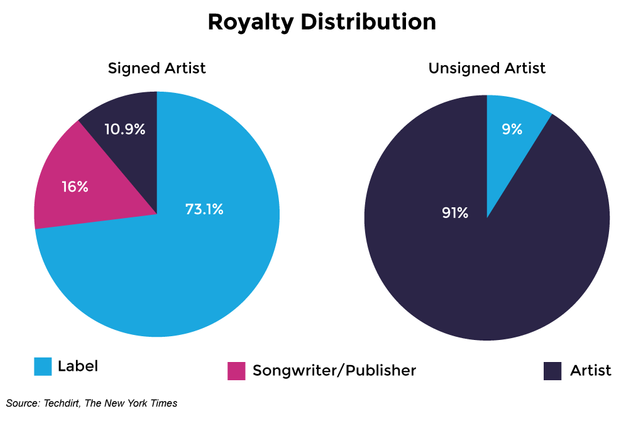
A record company pays for the production and promotion of a record. If your record never sells then you don't have to pay them back a single cent. Sounds good, right?
But if your record does sell you have to pay them back every single cent before you get any royalties from them.
Royalties from a record company are not the same as the royalties we've discussed so far, except the mechanical royalties, which a record company pays you.
So, let's say you have a band with four members in it and you negotiate a deal with a record company that pays you 10% royalties on every record sold. To keep the math simple let's say your record sells for $10 each.
10% of $10 = $1 split between 4 band members = .25 cents each.
Again, to simplify the math, let's say it costs about $1 to press a CD which is pretty close to the true cost.
Let's assume that the company presses 50,000 Cd's at a cost of $50,000 and they sell 30,000 units.
They also had expenses of $20,000 to help promote the release of the CD.
Record Company Expense:
$50,000 to press the CD's
$20,000 promotional costs
$70,000 total costs
Record Company Income:
30,000 units sold @ $10 each = $300,000
minus 70,000 costs
$230,000 profit
Now you would think it's easy to figure out the royalties owed to the band, right? 30,000 units sold times $1 each is $30,000 in royalties, right?
Wrong. The artist gets charged for all of the expenses before getting their share.
$30,000 - $70,000 = minus $40,000
The band would still get the mechanical royalties from the initial CD pressing regardless of CD's sold.
$45500 mechanical royalties paid to publisher and writers (.091 cents per song x 10 songs =.91 x 50,000 = $45,500)
$45.500 with half going to the writers = $22,750 which in most cases is not split evenly between the band. Only the writers would get this.
The band owes the record company $40,000 even though the record company made a $230,000 profit! Fuckers!
Now lets' say the company sold all 50,000 copies and made $500,000 with the same costs of $20,000 for promotion.
The record company makes $500,000
Now the band made $1 for each unit, or $50,000 - $70,000 of expenses = $20,000 the band owes them!
Let's say the CD is a hit and sells 100,000 copies with the same promotional costs. We just have to adjust the $1 cost per unit to press more.
$1 x 100,000 - $100,000
- $20,000 promotional costs
$120,000 total costs
The record company now made
$1,000,000
and the band made
100,000 x $1 = $100,000 - 120,000 total costs = MINUS $20,000! Still in the hole.
If somehow the band was really successful and was able to pay all the expenses out of their 10% until they were net positive, usually at that point it would be time to record a follow-up CD meaning the record company would advance you some money putting you in debt again. They can run up additional promotional charges at their discretion ultimately charging it all back to the artist, all the while keeping 90% of every sale.
If your CD flops then they bite the costs but if it succeeds you absorb all the costs and pay it out of only your 10% royalty while the company earns 90%. The burden tears a lot of bands to shreds.
In addition, the other royalties discussed earlier are often not distributed evenly by the band members. Most bands have 1 or 2 members that write all the songs, meaning they will make lots of money from radio play, mechanical royalties, and sync rights while the other musicians in the band who did not write the songs make nothing. This leads those band members wanting to get their songs on the next record which frequently are not as good of songs and lead to decreased sales.
So, how do you get around this dilemma?
Pretesting = Leverage = Success
Bands are in a better position to leverage a record company if they are already pretested. What does that mean?
Even the largest, most established companies will pretest a product before rolling it out. Pepsi Co. is a huge company with the resources and ability to roll out a new product nationwide. However, when they created their new product called Pepsi One, they first pretested it in select locations, first in Portland, Oregon. They did surveys and consumer studies, modified the formula and the packaging, then tested it again in Seattle, Washington, and Sacramento, California before rolling it out nationally.
A band that is pretested and can sell CD's and gains radio play in a certain geographic and demographic area is more likely to succeed in similar areas.
If you can sell 10,000 CD's on your own within a year's time you'll have many independent record labels beginning to approach you wanting to sign you to a contract. If you can sell 40,000 CD's on your own in a year you'll have major labels looking to sign you. Most major labels know that if you can do that all on your own in a city like San Francisco, for example, then you'll probably achieve the same results in many other cities across the US and if they don't sign you up their competitors will.
This creates a bidding war between major record labels all competing to sign your band, like a record company FOMO (Fear Of Missing Out). The longer you can hold out and the higher they bid against each other the better off you'll be and it gives your band a hell of a lot of leverage. Once a company spends over $500,000 just to sign you they're going to make damn sure they put their office to work to recoup that expense which works in your favor.
However, knowing you're ultimately going to foot the bill anyway, you could be smart and pay the costs while retaining 100% control of your profits, like the Dave Matthews Band did. These guys are my hero, not so much for their music, but for their music business skills.
There first self-released CD sold over 10,000 copy's and every independent label wanted to sign them, but instead of signing their life away they just hired the same people the record companies we going to hire and charge them for anyway. The cost to hire a radio promoter and publicist to promote them was the same either way, but they made more from their CD sales which they sold for $10 and it cost them $1 to press. So they were paying for it all with 90% profits per sale instead of 10%.
Their 2nd release sold over 50,000 copies and all the major labels fought to sign them and they still didn't sign. They just kept making money hand over fist and grew their fan base becoming much wealthier than many other more famous at the time.
They could afford to hire and pay for their own producers, concert promoters, ticket publishers, radio promoters, publicists, studios, everything they needed.
Many bands started following their lead and selling their own CD's, most notably rap groups like Dr. Dre, Eminem, and 50-Cent sold directly to their fans and used the money to further their careers, start their own labels, and basically told the record companies to fuck off because they didn't need them at that point.
The Woman Who Made Over A Million Dollars Giving Her Music Away For Free
There's an artist named Amanda Parker who once had a record deal and sold quite a few copies, but the record company dropped her because it wasn't enough money for them. She decided to give her music away for free to anyone in her audience that wanted it asking them to pay if they felt like it.
You can read about her inspiring story called Turning Your Audience Into Supporting Fans - Her Music Is Free But Fans Paid It Forward To The Tune Of $1.2 Million
Conclusions
You've probably realized by now that I don't like record companies and how they rip off artists, but these days there are alternatives like Musicoin, VOISE, Muse, Viberate, Busk, and, of course, Steemit Open Mic.
If you're a songwriter or band dreaming of making a living from the music you create, I highly recommend you look into other options before signing your musical right away, educate yourself before attempting to find a publisher, and build a loyal, strong audience before negotiating with publishers or record companies. They're not all they are held up to be and these days there are other ways to get your music heard and find a following of fans.
You don't need a lot of fans or to be famous to make a decent income from your talent if you know how to reach people, know how to negotiate, and know what your rights to your own creations are.
Copyrighting your music is not that difficult and can even be done online and if you write good songs and are prolific, you can learn how to pitch them to artists or publishers who can do that for you.
I hope this post taught you something about copyrights, inspires you to copyright your work, and makes you appreciate what an amazing opportunity Steemit is for finding an audience and make some money playing your music.
I want to leave you with a final thought.
There is music and then there is the music business which is two completely different things. If you, like me, love to play music you may not want to make a business out of it at all. I've seen many artists dive into the music business turn their joy into a living hell and I wouldn't wish that on anyone. If you're not the type of person that can separate the two, the music from the music business, or don't have a thick skin and have to choose one over the other, I'd recommend the music over the business every time. The reason is simple. Music is creative and breathes energy into your soul and into those who hear it and the music business does not. It steals your energy and exploits your creativity.
Related Posts
How I Booked 300 Shows Per Year For My Rock Band - Growing Your Music Into A Business
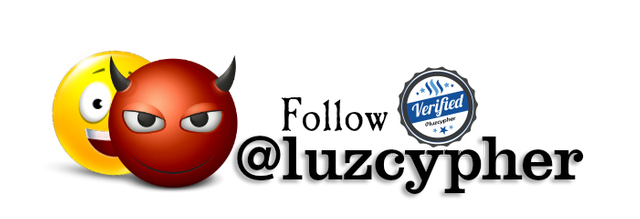
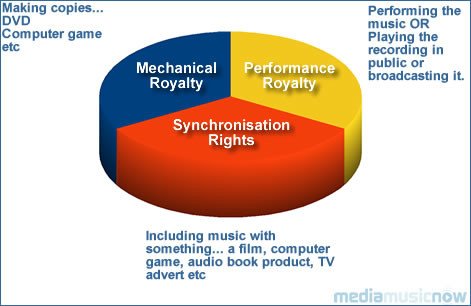
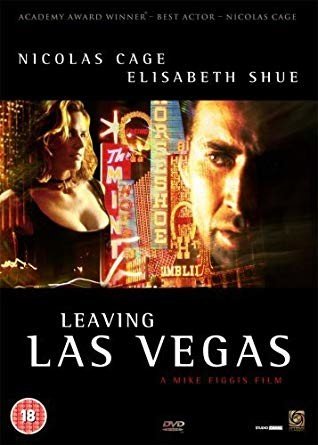
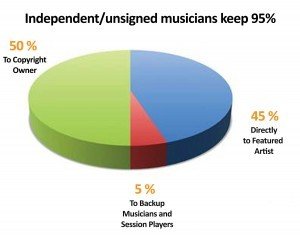
What is the "UCLA Mucic Business school" and why did they not teach you about the moral rights of songwriters? ☻
This is really helpful info, @luzcypher.
I've been thinking about trying to shop around the songs that I've written, and this is super helpful.
I've always assumed that record companies suck...
You're better off staying away from record companies until you are already building a large crowd and selling your music. They are leeches that will stroke your ego to get their greedy fingers into your pie.
I really like the way Amanda Parker went about distributing her music. If I was to start over with a new band that's what I would do today. There's a link to her story and video in this post. Check it out, it will inspire you.
Thanks for reading this post @tarotbyfergus. Peace.
Yaaasssss!!! Thank you for posting this!! So important for any musician that creates original works.
Respect. Solid Information(s)!
Mille grazie
Dankeschön
Brilliant! Thanks for sharing this kewl information! Nice 1 luzcypher ! :D
wow totally amazing and interesting post,very helpful and full of information,thank you for sharing @luzcypher
This is vital information, thank you for sharing
You're welcome. Thanks for reading my post.
Wow. Great work with lots of insight. Thanks for the links.
I really appreciate this info. I have done...music, jingles, songs...I have fun doing it all. I want to do voiceovers now for steem monster cards. Thank you. I will finish the lyrics to this song and post it for sure!
Joy
Your comment on another post inspired this post. Thanks.
This post was shared in the Curation Collective Discord community for curators, and upvoted and resteemed by the @c-squared community account after manual review.
Hi, gracias por la información muy buen post
Gracias a ti.